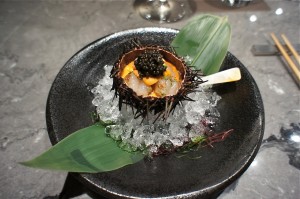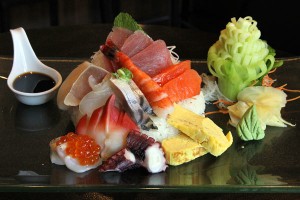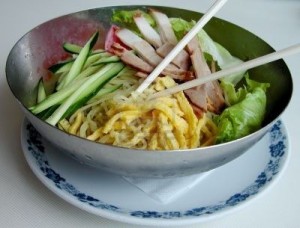Japanese Cuisine: A Unique Spin on Ordinary Seafood
 An emphasis on fresh ingredients, a concentration on primarily seafood and its unique, tantalizing presentation are the hallmarks of Japanese cuisine that sets it apart from the rest. The cuisine that is enjoyed by many at present is not strictly Japanese for it was subject to western influences in the 20th century. Regardless of this evolution, a number of Japanese dishes such as sushi, tempura and sashimi still remain favourites.
An emphasis on fresh ingredients, a concentration on primarily seafood and its unique, tantalizing presentation are the hallmarks of Japanese cuisine that sets it apart from the rest. The cuisine that is enjoyed by many at present is not strictly Japanese for it was subject to western influences in the 20th century. Regardless of this evolution, a number of Japanese dishes such as sushi, tempura and sashimi still remain favourites.
 Traditional Japanese cuisine allows the discerning epicurean to enjoy steamed white rice, usually presented in a small bowl with a number of side dishes such as a miso soup. Another factor that distinguishes this cuisine from others is its reliance on seasons for certain types of dishes. Traditional ingredients used include meat, dairy products, soy sauce and miso but mainly the Japanese opted to exploit their natural location and concentrate on the use of seafood in their cuisine. Furthermore, the limited use of oils in preparation and the dependence on steaming and stewing makes their dishes more palatable and healthy.
Traditional Japanese cuisine allows the discerning epicurean to enjoy steamed white rice, usually presented in a small bowl with a number of side dishes such as a miso soup. Another factor that distinguishes this cuisine from others is its reliance on seasons for certain types of dishes. Traditional ingredients used include meat, dairy products, soy sauce and miso but mainly the Japanese opted to exploit their natural location and concentrate on the use of seafood in their cuisine. Furthermore, the limited use of oils in preparation and the dependence on steaming and stewing makes their dishes more palatable and healthy.
 In Japanese gastronomy, the most commonly produced dishes are tempura, i.e. battered and deep fried seafood and vegetables, yakitori grilled chicken, sushi and a host of other grilled, stewed, steamed, stir-fried and pickled dishes. The cuisine also distinguishes between special dishes which are made on special occasions. For example, Botamochi is a rice dumpling associated with spring, Osechi during the New Year, a steamed rice cake called Chimaki made for the Gion Festival and Sekihan which is served during any occasion that gives cause for celebration.
In Japanese gastronomy, the most commonly produced dishes are tempura, i.e. battered and deep fried seafood and vegetables, yakitori grilled chicken, sushi and a host of other grilled, stewed, steamed, stir-fried and pickled dishes. The cuisine also distinguishes between special dishes which are made on special occasions. For example, Botamochi is a rice dumpling associated with spring, Osechi during the New Year, a steamed rice cake called Chimaki made for the Gion Festival and Sekihan which is served during any occasion that gives cause for celebration.
When dining, the usage of chopsticks is quite frequent and in most restaurants in Beijing, the correct use of chopsticks is considered to be an important element of table etiquette. Observing proper table etiquette is considered to be an integral element of the cuisine as well and therefore in Japanese cuisine, it is customary to eat everything that is presented and when drinking, it is customary to wait till a toast is made, whether it is a formal or informal dinner. Therefore, it is best to keep such etiquette in mind when dining in a Beijing luxury hotel. If you are staying in the city and wish to dine at a world renowned hotel, The Peninsula Beijing is an ideal choice for the service is impeccable and their meals are delectable.
Related posts
Archives
Categories
- Appetizers (23)
- Arab (48)
- Bars (33)
- Burmese (6)
- Café (23)
- Casual Dining (28)
- Chinese (35)
- Coffee House (27)
- Desserts (27)
- Destination Dining (368)
- Diner (16)
- Family Restaurants (57)
- Fast Food (52)
- Fine Dining (510)
- Food Facts (209)
- Healthy Food (93)
- Hong Kong (10)
- Indonesian (15)
- Italian (2)
- Japanese (17)
- Main Dishes (51)
- Maldivian (71)
- Miscellaneous (8)
- Miscellaneous Topics (366)
- Palate (64)
- Recipes (81)
- Restaurants (192)
- Sea Food (85)
- Singaporean (32)
- Sri Lankan (61)
- Steaks & Grill (59)
- Street Food Stalls (138)
- Thai (88)
- Types of Cuisines (108)
- Vegan (52)
- Vegetarian (9)
- Vegeterian (35)
- Vietnamese (22)
- Western (11)

